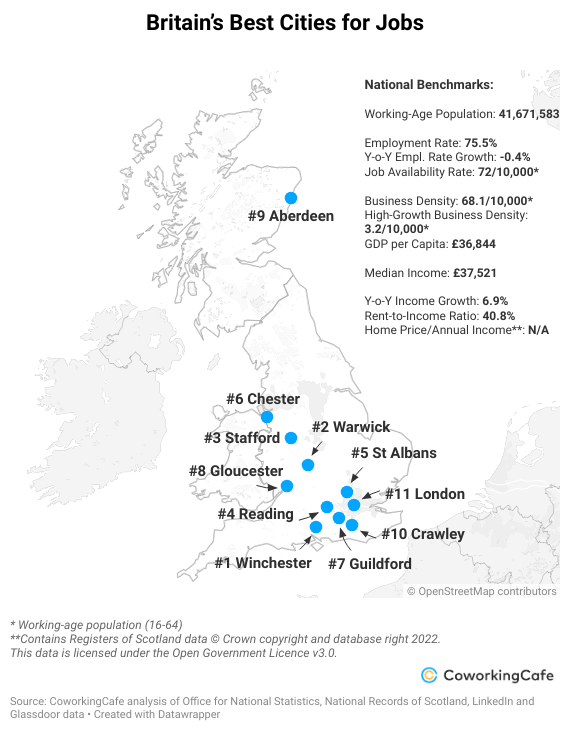A comprehensive new study has revealed that mid-sized regional cities are now outperforming major urban centres as Britain’s top destinations for jobs and work opportunities, with Winchester, Warwick, and Stafford claiming the leading positions nationwide.
Research conducted by CoworkingCafe examined Britain’s largest cities across multiple metrics including employment rates, business growth, and housing affordability, highlighting a significant shift in the country’s work landscape.
Regional centres dominate top rankings
The South East emerges as Britain’s strongest region for employment opportunities, placing eight cities in the nationwide top 20. The West Midlands follows with four cities making the cut, demonstrating the growing economic strength of Britain’s regions.
Winchester topped the overall rankings, followed by Warwick and Stafford, with all three offering a compelling combination of thriving business environments, strong job availability, and more manageable living costs compared to larger urban centres.
Dr Eleanor Thompson, employment economist at Manchester University, told our reporter: “These findings confirm what many professionals have been experiencing – that quality of life considerations are driving a redistribution of talent and opportunities away from traditional economic powerhouses toward well-connected regional hubs.”
London ranks 11th despite strong business environment
Despite its global reputation as a business centre, London placed 11th in the overall rankings, with its strong performance in some categories offset by significant affordability challenges.
The capital continues to offer significant advantages, ranking second nationwide for its business environment with 85 active businesses per 10,000 residents and the third-highest density of high-growth enterprises in Britain. London also maintains a solid job availability rate with 115 job postings per 10,000 working-age residents.
London’s median annual earnings of £44,780 places it fifth highest nationwide, reflecting the strong earning potential that continues to attract talent despite the high cost of living. However, housing affordability remains a major obstacle, with rents consuming over 50% of median income and home prices averaging nearly 13 times the median salary.
Commuter belt cities offer alternative options
Several cities within commuting distance of London feature prominently in the top rankings, potentially offering workers the benefits of proximity to the capital with improved affordability.
Reading (4th), St Albans (5th), Guildford (7th), Crawley (10th), and Bracknell (15th) all secured places in the top 20, suggesting that these locations provide strong job markets with more manageable living costs for those still wanting access to London.
James Wilson, head of recruitment at Brighton-based Meridian Staffing, commented: “We’re seeing increased interest from candidates looking to base themselves in regional hubs while maintaining the option to access London when needed. The pandemic-driven shift to hybrid working has accelerated this trend, with many employers now actively recruiting in these areas.”
Employment metrics show regional variations
The study analysed multiple factors affecting work opportunities, including employment rates, job posting density, business growth, and affordability metrics.
While the 75.9% employment rate in London demonstrates a relatively stable job market, with 1.6% year-on-year growth, many regional cities are showing stronger performance in both absolute employment levels and growth rates.
The shifting pattern reflects broader changes in Britain’s economy post-pandemic, with increased remote working options and digital connectivity enabling more distributed economic growth.
For professionals considering relocation, the research suggests looking beyond traditional employment hotspots to identify cities offering the best combination of job opportunities, business environment, and affordability for their individual needs.
The full study, including detailed rankings of all analysed cities and the ability to sort them by different metrics, is available on the CoworkingCafe website.













